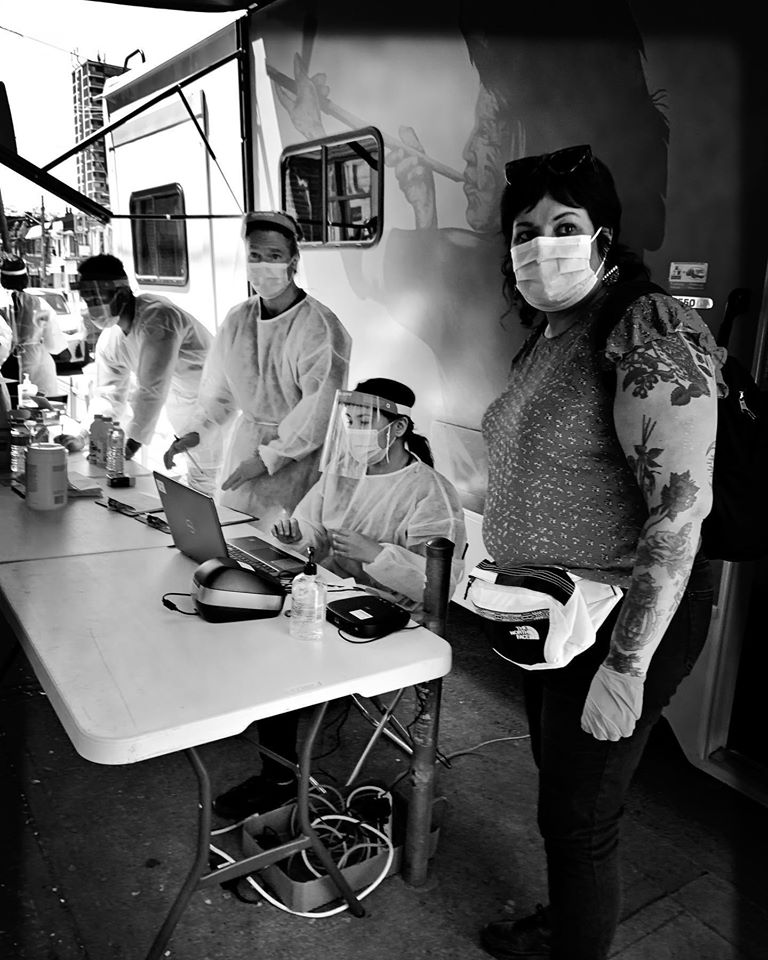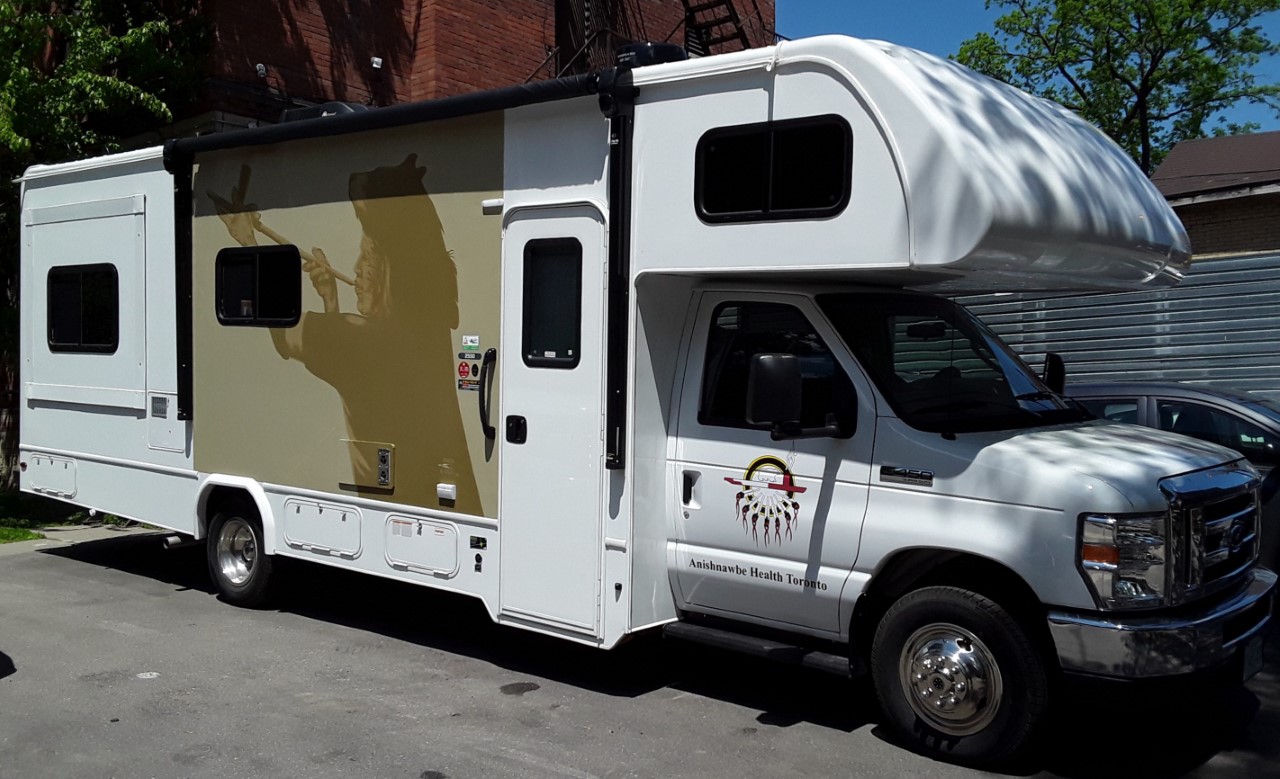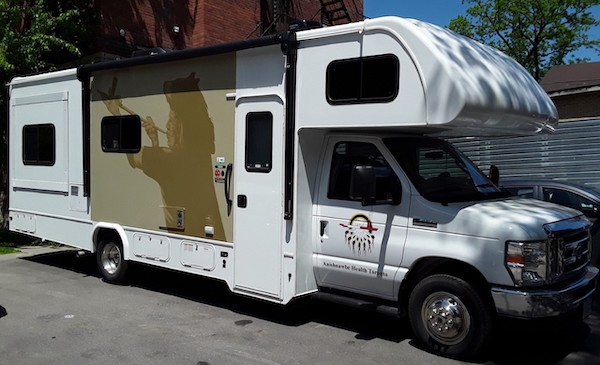For over 30 years Anishnawbe Health Toronto has been supporting the health of the Indigenous community in Toronto. With three main locations in the east end of the city’s core, the community health centre recently launched a mobile health unit to respond to the community’s changing needs during the pandemic. On Friday June 19 we chatted with Harvey Manning, Director of Programs & Services at Anishnawbe Health Toronto to learn more.

Why did you create a mobile health unit? What is it?
When the pandemic hit we knew something had to be done. Most of the time people come to see us in person, but with physical distancing we saw that we had to change our approach. We already knew that so many of the people on the streets of this city are Indigenous and we had to take care of them during the pandemic. We had this idea to turn a RV into a mobile health service to reach people where they are. The main goal is to serve the Aboriginal Peoples who are homeless and hopefully get them off the streets. First we try to get them into a room and then secure a longer term option. While the team is out there we also offer some basic health care and COVID testing.
How did you get it up and running?
It came together pretty quickly, but at the same time it felt like it took too long. We pitched the idea to one of our funders and they were onboard right away. We hired a driver, a nurse practitioner, a social worker and a housing worker,and got going.
What does a typical day look like for the team onboard the mobile health unit?
We do most of our work in the encampments. Someone’ll head out the day before to figure out where we should set up and to let people know we’ll be onsite the next day.
To do this work we’ve started partnering with South Riverdale Health Centre (SRHC). There are a lot of issues with the encampments. Usually the team from SRHC does crowd control and deals with any overdoses – because there have been several overdoses.
Who are you serving and what are you hearing from them?
The primary goal is to support the Aboriginal People who are homeless in the city, but we don’t turn our back on anyone. If someone wants a COVID test, we give it to them. If someone has a wound that needs care, we do that too.
Folks in encampments tell us they feel safer outside, rather than inside. People don’t want to go to assessment centres. At the Moss Park camps at least half the people are Aboriginal. We know another camp is filled with almost all Aboriginal People.
What is the demand for COVID testing and how does it work?
Demand for the tests is huge and growing. Honestly, we struggle to keep up. Sometimes we partner with Women’s College Hospital – especially as we’ve been getting more requests from the shelters. The hospital has a team dedicated to outreach and testing. We did 100 COVID tests just at Fred Victor.
In the first three weeks of June we helped administer 551 COVID tests and the requests are building daily. As we go along it’s snowballing. We’re getting more calls from people wanting us to do testing. We’re moving quickly and learning quickly. We’re also getting more calls from people who want to volunteer.

Who is most vulnerable at this time?
We’re reaching back two to three years in our files to check up on people who we haven’t heard from. All of our counsellors have been on the phones and again, there has been a huge demand. People really want to talk to someone. They’ve become so isolated.
We also worry about our seniors and our elders. We will be going to a seniors’ building next week for primary care. They’re hesitant to get on transit, so we’re going to them. We’ll also be asking if they want to get tested.
How is cultural support being incorporated into your services?
It’s quite amazing. I never thought that we’d be doing cultural programming or healing by phone, but those services have been in high demand. If people need traditional medicine, we will take that medicine to them throughout the city. People are turning to culture more than every before to cope during pandemic. They seem to really need that these days. Right now we have a box of medicine at the front desk and people can come get what they need.
What gives you hope right now?
A lot of what I’ve seen has been heartbreaking, but I’m also seeing change. There’s never seen so much support – from partners, volunteers and funders. The South Riverdale partnership is new. It’s been great to come together.
I’m also seeing a lot of optimism. When you go into the encampments, there are other groups in there just trying to help by bringing water and other supports. It’s been pretty amazing.
There won’t be a COVID vaccine for some time. Do you hope to keep the mobile unit going?
Yes, there is clearly a need and we have to do it – not just for COVID. We need to protect the community. Toronto is a big city. There are large pockets of Indigenous People living in Scarborough and elsewhere. For some of those mothers to come downtown to see us with kids – that’s half a day. It’s not affordable or practical. Having a mobile service makes sense. We can offer more primary care that way.
But the funding for the unit runs out at the end of the year. We need more support to keep it going.
To make a donation to keep the mobile health unit going or to support Anishnawbe Health Toronto’s other work, please visit their website.



